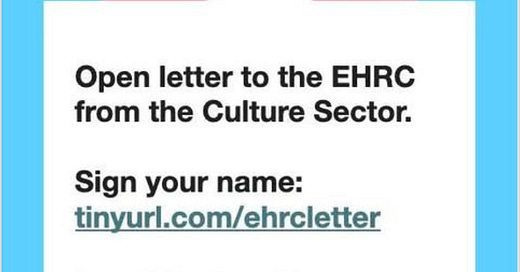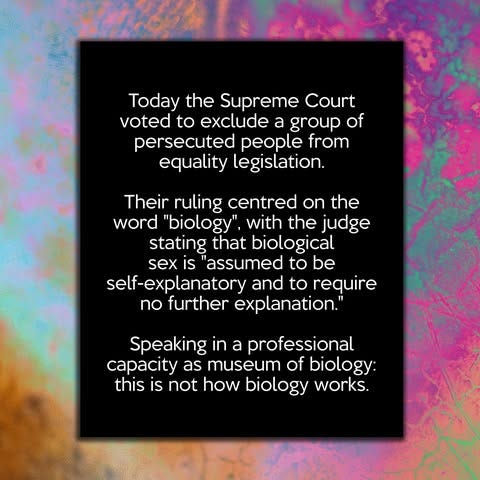On April 16, 2025, the UK Supreme Court ruled that, under the Equality Act 2010, the legal definition of "woman" must be based on biological sex — explicitly excluding transgender women, even those with a Gender Recognition Certificate (which gov.uk interestingly still refers to as ‘legally recognised’). This decision followed a long-running legal battle initiated by the campaign group For Women Scotland and echoes a similar declaration from the United States – made on Donald Trump’s first day in office.
The response to this ruling from much of the UK's cultural sector has been… slim. I know funding is complicated, few cultural institutions have the luxury of being able to alienate government funding. It is perhaps telling that the few museums that have spoken out are those with independent income sources and/or based on crowdfunding models. But if that is the reason for the silence, it seems to set a worrying precedent (particularly if the UK follows US on other exclusionary policies). If you – as an individual or an institution – are looking to get involved, you may want to sign and/or post to the Open Letter to the Equality and Human Rights Commissioner from the Culture Sector. (Scroll below for a post from the Watershed linking to the Open Letter than can easily be reshared).
Here are some statements from culture sector bodies I have seen:
The Crab Museum:
The Vagina Museum:
Thackray Museum of Medicine:
Thanks Jo Johnson for pointing this one out to me.
Museum of Transology:
Watershed, Bristol
The text accompanying this post reads: “Our CEO Clare Reddington has worked with trans activists to create an open letter to the Equality and Human Rights Commission from the Culture Sector, in solidarity with Trans, Nonbinary and Intersex communities.
Sign your name at the link in the post (it's linked in our link in bio too!). Please share widely, and if you are not able to sign for your organisation, please share with someone who can 🤍 Thank you x”
Bristol Old Vic:
I hope there are more examples than these few – and if so, they deserve to be highlighted.
I completely understand that the absence of posting is not down to the social media managers. Part of what makes the Watershed’s post so compelling is that it comes right from the top and is taking affirmative action, not something a social media manager can do on behalf of an entire organisation without wider support. This is a leadership point, with ramifications on social.
To my mind this raises a wider point about museum and the culture sector diversifying their funding – through methods like digital membership schemes and other earned income streams. That would reduce reliance on funding that is potentially politically influenced. Independence should empower institutions to live up to their values.
Culture should not discriminate. It's deeply saddening, then, that so few of our cultural leaders have felt able, or have chosen, to champion inclusivity in the face of this ruling. Especially when many museums list EDI (Equality, Diversity, and Inclusion) as core to their strategic mission.
The counter-argument
The counter-argument typically raised – and visible in some of the comments responding to these posts – is concern among some cisgender women about trans women accessing female-only spaces.
These don’t make up the majority of responses, but there is a noticeable and vocal contingent of negative responses, particularly on Facebook.
I’ve yet to find evidence that shows trans women are a risk. I’ve found quite a lot to suggest that the trans community are much more at risk of abuse than the cis community. For example: UCLA School of Law (2017-18), Hasenbuch et al (2019), Stonewall Trans Report (2018).
Having worked at Rape Crisis Tyneside and Northumberland (RCTN) and Survivor Space Oxfordshire as a helpline respondent, I spoke to survivors of sexual abuse. All those survivors were survivors of abuse from cisgender men. Trans women are not the reason survivors are contacting these services. I do not believe addressing sexual violence by excluding and delegitimising trans women will make spaces safer; it will only expose transgender people to further marginalisation. The landscape for rape crisis centres is now quite complicated. The CEO of RCTN put out a LinkedIn post expressing the service would continue to support cis and trans women and girls, but a lot of the comments suggest this is no longer legally supportable without also inviting in cis men.
Fortunately, museums typically do not face such acute questions about who their service is for. Museums are spaces for everyone. Which makes their silence a bit weak.
Wrapping up
Culture matters. Museums matter. They are places where we explore our shared humanity and learn from the past. If they are not places of inclusion, they risk losing that vital role.
I would love to know if there are more examples of institutions standing up for trans rights – beyond the Crab Museum, the Vagina Museum, Thackray Museum of Medicine, Museum of Transology, Watershed, and Bristol Old Vic. I hope there are more.
Many thanks to Rebecca Atkinson for her article on this topic for Museums Association. MA also reports in this piece that Dorset Museum & Art Gallery posted in support, but this post appears to have been taken down since.











Thank you for this post. I want to further it as well to say that solidarity posting is an important first step, but taking action is the next. People generally still have trust in museums as institutions and look to museums to learn. While an exhibit is one way to teach (and the way most museums are likely comfortable with), providing resources and giving a platform to organizations that are in this space (hopefully that you already have a partnership with) is another way that can be more immediate.
Crab Museum had an amazing post yesterday that I feel is extremely effective; taking the time to explain, but not pontificate. https://www.instagram.com/crabmuseum/p/DJEKUkYxCRI/